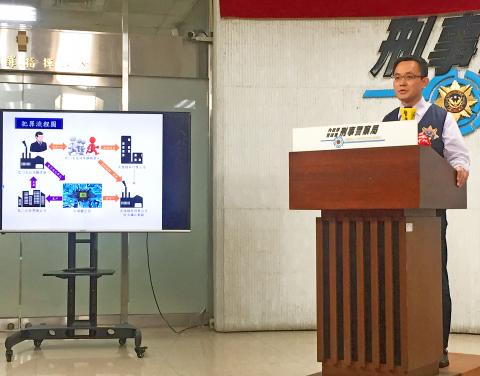Police arrested six current and former employees of German chemical maker BASF SE for allegedly leaking the company’s technology to a Chinese rival, the Criminal Investigation Bureau said yesterday.
The technology, used to produce high-purity ammonia for semiconductor applications, is estimated to have a market value of NT$3.52 billion (US$114.2 million), the bureau said, adding that the Chinese company allegedly agreed to pay approximately NT$200 million for the information.
The bureau early last year received a report that senior employees at a Taiwanese subsidiary of BASF are allegedly involved in intellectual property theft, Seventh Investigation Unit captain Lu Sung-hao (呂松浩) told a news conference in Taipei.

Photo: CNA
Bureau investigators found that a Chinese chemicals company was planning a factory in Jiangsu Province’s Zhenjiang City, police said.
To compete with BASF, the Chinese company hired a former BASF employee, surnamed Lin (林), who oversaw a factory in Taoyuan’s Guanyin District (觀音), paying him more than NT$410,000 per month since 2017, police said.
Lin recruited several engineers, who resigned from BASF at different times to join the Chinese firm, and a senior manager surnamed Huang (黃), who remained at BASF to continue providing information, police said.
Huang is said to be the head of BASF’s global electronic materials and engineering department, and oversaw the engineering departments at the subsidiary, police said.
Key evidence of the leak was found in October and November, with overseas bank accounts of the six showing that they had received a combined NT$40 million from the Chinese company, police said.
Police arrested Huang and five engineers who returned to Taiwan on Dec. 31 for alleged breaches of the Trade Secrets Act (營業秘密法), they said.
BASF’s key technology has already been leaked to the Chinese company, police said.
BASF said in a statement that it was aware of the investigation and the employees involved had been suspended from work.
“We have taken immediate steps to support the investigation led by local law enforcement officials and protected our information,” it said.
“BASF is committed to investing in and protecting intellectual property resulting from research and development, as well as production of know-how both by BASF and our customers. To this end we have established systems and policies which minimize risks,” it said.
“In light of this situation, we will further reinforce these information protection systems,” it said.

NATIONAL SECURITY THREAT: An official said that Guan Guan’s comments had gone beyond the threshold of free speech, as she advocated for the destruction of the ROC China-born media influencer Guan Guan’s (關關) residency permit has been revoked for repeatedly posting pro-China content that threatens national security, the National Immigration Agency said yesterday. Guan Guan has said many controversial things in her videos posted to Douyin (抖音), including “the red flag will soon be painted all over Taiwan” and “Taiwan is an inseparable part of China,” while expressing hope for expedited “reunification.” The agency received multiple reports alleging that Guan Guan had advocated for armed reunification last year. After investigating, the agency last month issued a notice requiring her to appear and account for her actions. Guan Guan appeared as required,

A strong cold air mass is expected to arrive tonight, bringing a change in weather and a drop in temperature, the Central Weather Administration (CWA) said. The coldest time would be early on Thursday morning, with temperatures in some areas dipping as low as 8°C, it said. Daytime highs yesterday were 22°C to 24°C in northern and eastern Taiwan, and about 25°C to 28°C in the central and southern regions, it said. However, nighttime lows would dip to about 15°C to 16°C in central and northern Taiwan as well as the northeast, and 17°C to 19°C elsewhere, it said. Tropical Storm Nokaen, currently

‘NATO-PLUS’: ‘Our strategic partners in the Indo-Pacific are facing increasing aggression by the Chinese Communist Party,’ US Representative Rob Wittman said The US House of Representatives on Monday released its version of the Consolidated Appropriations Act, which includes US$1.15 billion to support security cooperation with Taiwan. The omnibus act, covering US$1.2 trillion of spending, allocates US$1 billion for the Taiwan Security Cooperation Initiative, as well as US$150 million for the replacement of defense articles and reimbursement of defense services provided to Taiwan. The fund allocations were based on the US National Defense Authorization Act for fiscal 2026 that was passed by the US Congress last month and authorized up to US$1 billion to the US Defense Security Cooperation Agency in support of the

PAPERS, PLEASE: The gang exploited the high value of the passports, selling them at inflated prices to Chinese buyers, who would treat them as ‘invisibility cloaks’ The Yilan District Court has handed four members of a syndicate prison terms ranging from one year and two months to two years and two months for their involvement in a scheme to purchase Taiwanese passports and resell them abroad at a massive markup. A Chinese human smuggling syndicate purchased Taiwanese passports through local criminal networks, exploiting the passports’ visa-free travel privileges to turn a profit of more than 20 times the original price, the court said. Such criminal organizations enable people to impersonate Taiwanese when entering and exiting Taiwan and other countries, undermining social order and the credibility of the nation’s